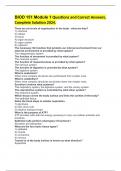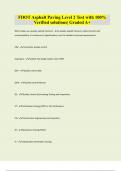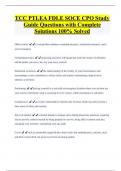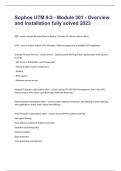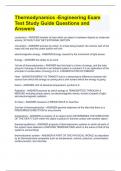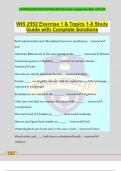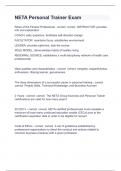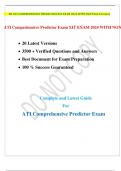Business Research Techniques – Modules on Grasple
Module 1
What is business research?
Business research is: a series of well-thought-out activities and carefully executed data analyses
that are aimed to help a manager avoid, solve, or minimize a problem.
i. Business research is well-thought-out: business research needs to pinpoint
exactly what the problem is, which factors are associated with the problem, and
which knowledge is already available to address the problem. While this sound
easy and straightforward, it is typically the most difficult step in any business
research project.
ii. Business research entail gathering and analyzing data: data can be collected by
means of surveys, experimentation extraction from companies’ internal
databases (e.g., customer account information), extraction from government
databases (e.g., CBS), web scraping, interviews, observations, etc.
iii. Business research is meant to help managers make better decisions: better
decisions are evidence-based decisions decisions that rely on data and facts
(the results of sound research).
Intuition should never be a substitute for research. While intuition definitely has its place in
managerial decision making, detached from rigorous data gathering and analysis, intuition is
as likely to lead to disaster as to success. While some people have argued that intuition
becomes more valuable in highly complex and changeable environments, the opposite is
true. The more unprecedented the challenges you face, the less you should rely on intuition
and the more on evidence/research.
Experience without research can go wrong
Experience definitely has its place in managerial decision-making. But experience should
never be a substitute for evidence-based decision-making. Detached from research, basing
decisions solely on experience could equally well lead to disaster as to success.
Debunking myths about business research
“Managers are from Mars, researchers are from Venus.”
1. Myth: there is no need to do/study business research for a future manager.
2. Reality: managers with knowledge about research have an advantage over those
without.
“Most research is not read”
1. Myth: Business research ends up in the bottom drawer.
2. Reality: For a knowledgeable manager, research need not to be intimidating.
“Big bucks”
1. Myth: Business research is only for the wealthiest organizations.
2. Reality: Business research is very diverse – it can be cheap - it can be expensive.
“Big decision”
1. Myth: Business research is only useful when you have a major decision to make.
2. Reality: For small decisions, the best managers carry out their own research.
,“Universal truth”
1. Myth: there is just one best way of researching a business problem
2. Reality: There is no such thing as an absolute truth in business*
*This does by no way imply that any approach is good.
How to evaluate whether business research is sound?
As future manager, you should follow an evidence-based approach to decision-making
you should be making decisions supported by sound research.
Sound research is characterized by six hallmarks:
1. Purposiveness
Knowing “the why” of your research
2. Rigor
Ensuring a sound theoretical base
Ensuring a sound methodological design
Biased questions or questions where respondents felt forced to give a “good” answer.
3. Objectivity
Drawing conclusions based on facts (rather than on subjective ideas)
There is a conflict of interest.
4. Parsimony
“Shaving away” unnecessary details
Explaining a lot – with little.
Big surveys with a lot of questions.
5. Replicability
Finding the same results if the research is repeated in similar circumstances.
6. Generalizability
Being able to apply the research findings in a wide variety of different settings.
- This should hold for fundamental research
- .. but much less so for applied research
Research has to be done on: different days, with different people, on different locations,
on different times etc.
Fundamental vs. applied research
Applied research
- To solve a current problem faced by a manager
- Applies to a specific company
- Within firms or research agencies
Fundamental research
- To generate new knowledge about how problems that occur in several firms can be
solved
- Applies to several organizational settings
- Mainly within universities (and knowledge institutes) (Unilever, P&G)
Summary
Why should you be knowledgeable about business research?
1. In order to be able to PERFORM business research
2. In order to be able to STEER business research
, 3. In order to be able to EVALUATE business research
The 7-step (deductive) research process
1 Define the business problem Albert Heijn’s online grocery delivery is not taking off
2 Formulate the problem statement Which factores influence consumers’ adoption of
online grocery delivery?
3 Develop a theoretical framework Consumer demographics, competing retailers’
(incl. hypotheses) offers,…
4 Choose a research design Archival data
5 Collect data Buy consumer panel data
6 Analyze data Perform a logit analysis
7 Write-up Which variables are (not) significant? What does this
imply for managerial decision making?
Deductive vs. inductive research
Deductive and inductive research are two research approaches. The main difference
between the two is that inductive research aims at developing a theory while deductive
research ais at testing a theory.
When using an inductive research approach, a researcher first makes observations (collets
data). Then (s)he tries to find a pattern in these observations and develops a theoretical
framework on the basis of this pattern.
When using a deductive research approach, a researcher first hypothesizes relationships
between variables based on theories. These hypotheses are the tested using data.
Inductive research starts with data (observations) and then moves from these data to broad
generalizations (a theory). In contrast, deductive research starts with theory and then tests
this theory using data.
Quantitative vs. qualitative research
Quantitative researchers emphasize the importance of formulating hypotheses based on
previous work and well-supported theories. The reasoning behind quantitative research is
largely deductive.
, Qualitative researchers adopt the opposite approach: they use observations as a starting
point and then seek explanations for their observations. The reasoning behind qualitative
research is largely inductive.
The two approaches are not mutually competing. They can be used in combination, within a
single research study.
Inductive research developing a theory
Deductive research testing a theory
Inductive research starts with data (observations) and then moves from these data to broad
generalizations (theory)
Deductive research starts with theory and then tests this theory using data.
Module 2
When does a business problem occur?
When there is a gap between the actual status of a company and the desired statement of a
company.
Two problems
1. The actual situation is seriously wrong and needs to be solved ASAP.
Pfizer may increase profits by having its sales reps approach doctors differently.
2. The current situation is not seriously wrong but can be improved.
AH boycotts Unilever’s products
What makes a good business problem? (1)
- Feasibility: Is it doable?
o Is the problem demarcated?
o Can the problem be expressed in variables?
o Are you able to gather the required data?
Existing data
New data
- Relevance: Is it worthwhile?
o Managerial relevance
Who benefits from having the problem solved? Managers one
company/one industry/multiple industries, but also end users and
public policy makers
o Academic relevance
Completely new topic no research available at all, although the
topic is important.
New context prior research is available but not in the same context.
Integrate scattered research different studies have focused on
different IVs/moderators; consequently, their relative importance is
not clear.
Reconcile contradictory research solve the contradictions through
introducing one or more moderators.
Module 1
What is business research?
Business research is: a series of well-thought-out activities and carefully executed data analyses
that are aimed to help a manager avoid, solve, or minimize a problem.
i. Business research is well-thought-out: business research needs to pinpoint
exactly what the problem is, which factors are associated with the problem, and
which knowledge is already available to address the problem. While this sound
easy and straightforward, it is typically the most difficult step in any business
research project.
ii. Business research entail gathering and analyzing data: data can be collected by
means of surveys, experimentation extraction from companies’ internal
databases (e.g., customer account information), extraction from government
databases (e.g., CBS), web scraping, interviews, observations, etc.
iii. Business research is meant to help managers make better decisions: better
decisions are evidence-based decisions decisions that rely on data and facts
(the results of sound research).
Intuition should never be a substitute for research. While intuition definitely has its place in
managerial decision making, detached from rigorous data gathering and analysis, intuition is
as likely to lead to disaster as to success. While some people have argued that intuition
becomes more valuable in highly complex and changeable environments, the opposite is
true. The more unprecedented the challenges you face, the less you should rely on intuition
and the more on evidence/research.
Experience without research can go wrong
Experience definitely has its place in managerial decision-making. But experience should
never be a substitute for evidence-based decision-making. Detached from research, basing
decisions solely on experience could equally well lead to disaster as to success.
Debunking myths about business research
“Managers are from Mars, researchers are from Venus.”
1. Myth: there is no need to do/study business research for a future manager.
2. Reality: managers with knowledge about research have an advantage over those
without.
“Most research is not read”
1. Myth: Business research ends up in the bottom drawer.
2. Reality: For a knowledgeable manager, research need not to be intimidating.
“Big bucks”
1. Myth: Business research is only for the wealthiest organizations.
2. Reality: Business research is very diverse – it can be cheap - it can be expensive.
“Big decision”
1. Myth: Business research is only useful when you have a major decision to make.
2. Reality: For small decisions, the best managers carry out their own research.
,“Universal truth”
1. Myth: there is just one best way of researching a business problem
2. Reality: There is no such thing as an absolute truth in business*
*This does by no way imply that any approach is good.
How to evaluate whether business research is sound?
As future manager, you should follow an evidence-based approach to decision-making
you should be making decisions supported by sound research.
Sound research is characterized by six hallmarks:
1. Purposiveness
Knowing “the why” of your research
2. Rigor
Ensuring a sound theoretical base
Ensuring a sound methodological design
Biased questions or questions where respondents felt forced to give a “good” answer.
3. Objectivity
Drawing conclusions based on facts (rather than on subjective ideas)
There is a conflict of interest.
4. Parsimony
“Shaving away” unnecessary details
Explaining a lot – with little.
Big surveys with a lot of questions.
5. Replicability
Finding the same results if the research is repeated in similar circumstances.
6. Generalizability
Being able to apply the research findings in a wide variety of different settings.
- This should hold for fundamental research
- .. but much less so for applied research
Research has to be done on: different days, with different people, on different locations,
on different times etc.
Fundamental vs. applied research
Applied research
- To solve a current problem faced by a manager
- Applies to a specific company
- Within firms or research agencies
Fundamental research
- To generate new knowledge about how problems that occur in several firms can be
solved
- Applies to several organizational settings
- Mainly within universities (and knowledge institutes) (Unilever, P&G)
Summary
Why should you be knowledgeable about business research?
1. In order to be able to PERFORM business research
2. In order to be able to STEER business research
, 3. In order to be able to EVALUATE business research
The 7-step (deductive) research process
1 Define the business problem Albert Heijn’s online grocery delivery is not taking off
2 Formulate the problem statement Which factores influence consumers’ adoption of
online grocery delivery?
3 Develop a theoretical framework Consumer demographics, competing retailers’
(incl. hypotheses) offers,…
4 Choose a research design Archival data
5 Collect data Buy consumer panel data
6 Analyze data Perform a logit analysis
7 Write-up Which variables are (not) significant? What does this
imply for managerial decision making?
Deductive vs. inductive research
Deductive and inductive research are two research approaches. The main difference
between the two is that inductive research aims at developing a theory while deductive
research ais at testing a theory.
When using an inductive research approach, a researcher first makes observations (collets
data). Then (s)he tries to find a pattern in these observations and develops a theoretical
framework on the basis of this pattern.
When using a deductive research approach, a researcher first hypothesizes relationships
between variables based on theories. These hypotheses are the tested using data.
Inductive research starts with data (observations) and then moves from these data to broad
generalizations (a theory). In contrast, deductive research starts with theory and then tests
this theory using data.
Quantitative vs. qualitative research
Quantitative researchers emphasize the importance of formulating hypotheses based on
previous work and well-supported theories. The reasoning behind quantitative research is
largely deductive.
, Qualitative researchers adopt the opposite approach: they use observations as a starting
point and then seek explanations for their observations. The reasoning behind qualitative
research is largely inductive.
The two approaches are not mutually competing. They can be used in combination, within a
single research study.
Inductive research developing a theory
Deductive research testing a theory
Inductive research starts with data (observations) and then moves from these data to broad
generalizations (theory)
Deductive research starts with theory and then tests this theory using data.
Module 2
When does a business problem occur?
When there is a gap between the actual status of a company and the desired statement of a
company.
Two problems
1. The actual situation is seriously wrong and needs to be solved ASAP.
Pfizer may increase profits by having its sales reps approach doctors differently.
2. The current situation is not seriously wrong but can be improved.
AH boycotts Unilever’s products
What makes a good business problem? (1)
- Feasibility: Is it doable?
o Is the problem demarcated?
o Can the problem be expressed in variables?
o Are you able to gather the required data?
Existing data
New data
- Relevance: Is it worthwhile?
o Managerial relevance
Who benefits from having the problem solved? Managers one
company/one industry/multiple industries, but also end users and
public policy makers
o Academic relevance
Completely new topic no research available at all, although the
topic is important.
New context prior research is available but not in the same context.
Integrate scattered research different studies have focused on
different IVs/moderators; consequently, their relative importance is
not clear.
Reconcile contradictory research solve the contradictions through
introducing one or more moderators.



